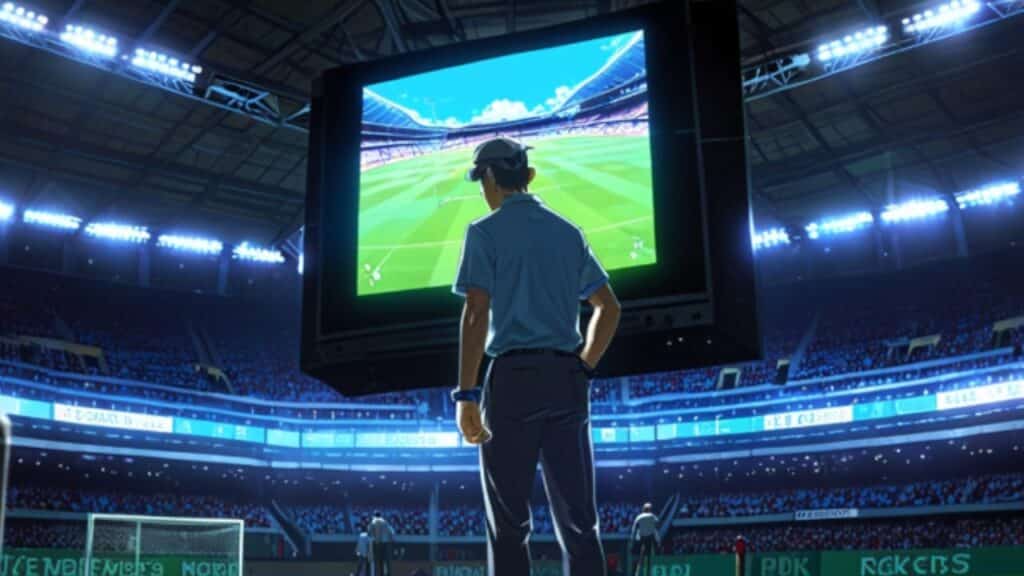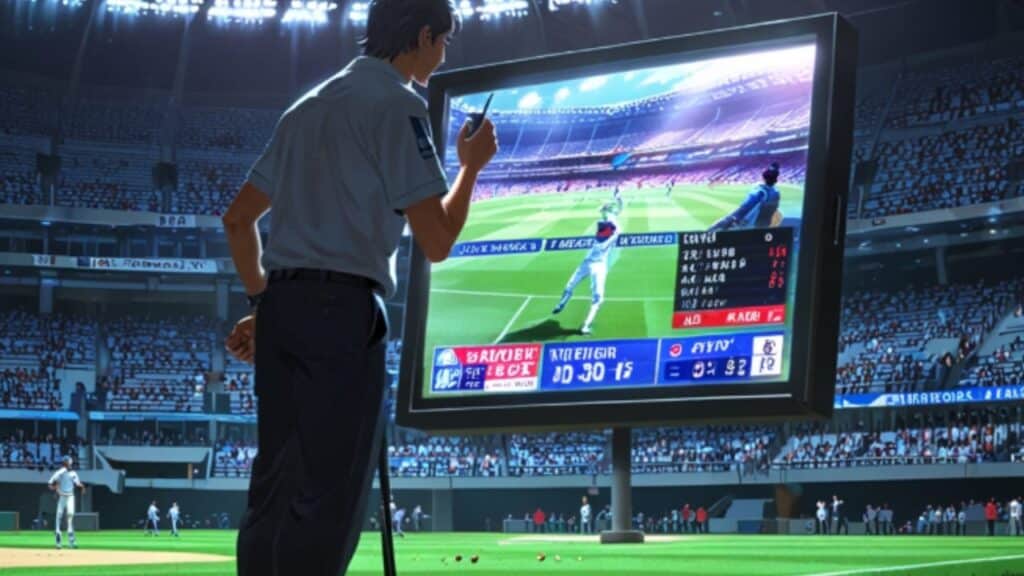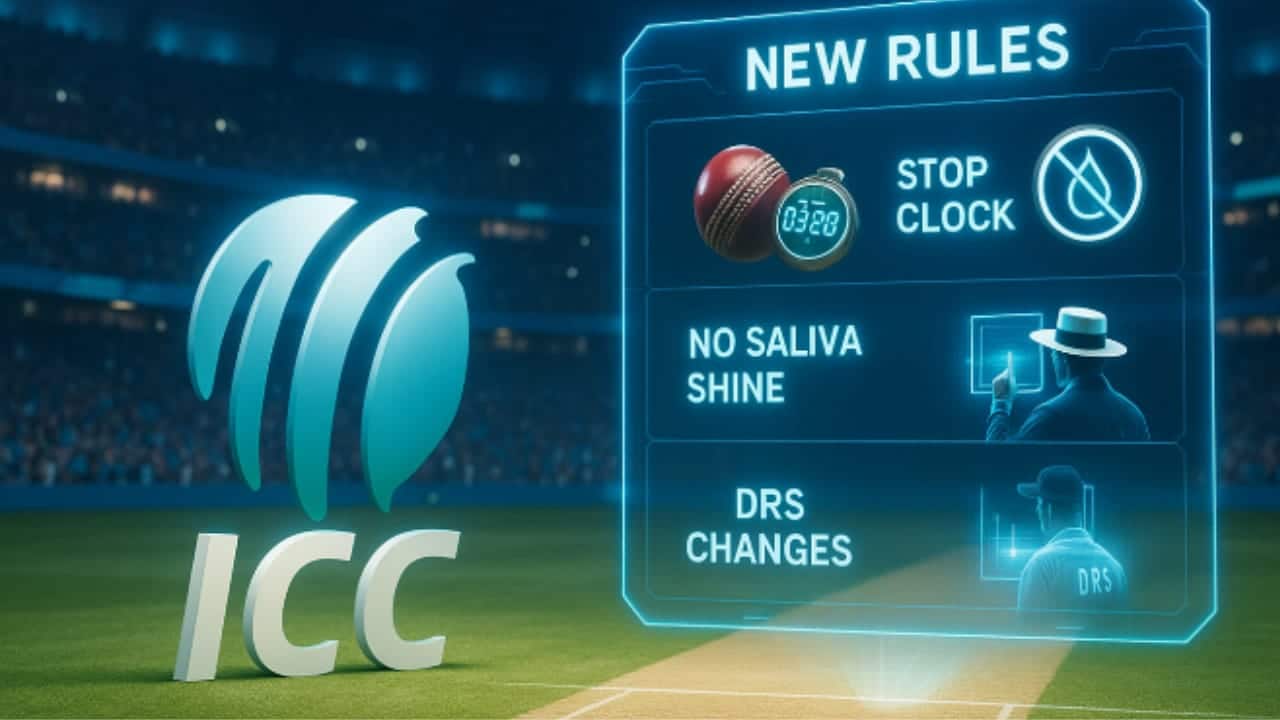ICC New Cricket Rules You Can’t Miss!
Cricket just got faster, fairer and more exciting!
The ICC’s new rules are transforming how the game is played – from penalty runs for slow play to stricter reviews and smart ball-change policies.
These changes will impact every match you watch.
Want to stay ahead of the game? Here’s everything you need to know in simple, easy-to-understand terms.
You can join us on our Telegram Channel and YouTube Channels for final updates.
ICC New Cricket Rules

Cricket is always changing, and the ICC (International Cricket Council) keeps updating the rules to make the game fair and exciting.
Recently, the ICC introduced new cricket rules that will affect Test matches, ODIs, and T20Is. Some rules are already in play, while others will start soon.
In this article, we will break down all the ICC new cricket rules in very simple language so that even kids can understand them.
We will cover:
- Stop Clock in Test Cricket
- No Mandatory Ball Change After Saliva Use
- New DRS Rules for Reviews
- Combined Reviews – Now in Order of Events
- Checking Fair Catch Even After No-Ball
- Stricter Rules for Deliberate Short Runs
- Full-Time Replacements in Domestic Cricket
Let’s dive in!
You can join us on our Telegram Channel and YouTube Channels for final updates.
Stop Clock in Test Cricket
What’s the New Rule?
The ICC new cricket rules now include a stop clock in Test matches to make sure teams bowl their overs on time.
Earlier, this rule was only for white-ball cricket (ODIs & T20S), but now it applies to Tests too.
How Does It Work?
- After an over finishes, the fielding team has 60 seconds to start the next over.
- If they take too long, the umpire will give two warnings.
- After the second warning, if they still delay, the batting team gets 5 extra runs.
- The warnings reset every 80 overs.
Why This Rule?
Test matches sometimes get slow because teams take too much time between overs.
The ICC new cricket rules want to keep the game moving so fans don’t get bored.
Read out – Meet the Indian Cricket Team Selectors: Selectors vs. Fans
No Mandatory Ball Change After Saliva Use

What’s the New Rule?
During COVID-19, using saliva to shine the ball was banned.
Even now, players cannot use saliva, but if someone does it by mistake, the umpires won’t always change the ball.
When Will the Ball Be Changed?
- Only if the ball becomes too wet or damaged.
- Umpires will decide if the ball is still good to use.
- If the ball is fine, the batting team gets 5 penalty runs instead of changing the ball.
Why This Rule?
Some teams were deliberately using saliva to force a ball change.
The ICC new cricket rules now stop this trick.
New DRS Rules
What’s the New Rule?
Sometimes, a batter is given out caught, but the replay shows the ball actually hit the pad, not the bat.
Earlier, if the umpire checked for LBW (Leg Before Wicket) and it was “Umpire’s Call”, the batter was not out.
Now, under the ICC new cricket rules, if the original decision was “out”, and the DRS shows “Umpire’s Call” for LBW, the batter will still be given out.
Example:
- Batter is given out, caught.
- DRS shows no bat, but the ball hits the pad.
- If LBW is “Umpire’s Call”, the batter is out (because the original call was out).
Why This Rule?
This makes DRS fairer and reduces confusion.
Read out – Complete List of All India Cricket Team Captains: World Cups, Records & Glory
Combined Reviews

What’s the New Rule?
Sometimes, two things happen at once—like an LBW appeal and a run-out appeal.
Earlier, umpires checked the run-out first. Now, they will check in the order it happened.
Example:
- If a batter is first hit on the pad (LBW) and then runs out, umpires will check LBW first.
- If the batter is out LBW, the run-out won’t be checked.
Why This Rule?
This makes the review process more logical and avoids wasting time.
Checking Fair Catch Even After No-Ball
What’s the New Rule?
If a fielder takes a catch, but the bowler has bowled a no-ball earlier, the umpires would not check if the catch was clean. Now, they will still check the catch.
What Happens Next?
- If the catch is clean, the batting team gets only 1 run (for the no-ball).
- If the catch is not clean, the batting team gets all runs scored.
Why This Rule?
This stops fielders from faking catches when they know it’s a no-ball.
Read out – BCCI Central Contracts 2024-25: Salary, Full List, and Surprise Comebacks
Stricter Rules for Deliberate Short Runs

What’s the New Rule?
If batters cheat by not completing a run properly, the umpires will:
- Give a 5-run penalty to the batting team.
- Let the fielding team choose which batter will face the next ball.
What is a Deliberate Short Run?
When a batter pretends to run but does not touch the crease to steal an extra run.
Why This Rule?
This stops batters from cheating with fake runs.
Full-Time Replacements in Domestic Cricket
What’s the New Rule?
In domestic first-class matches, if a player gets seriously injured (like a broken bone), the team can bring a full replacement player.
Conditions:
- The injury must be visible (not just a small pain).
- The replacement must be the same type of player (batter for batter, bowler for bowler).
Why This Rule?
This helps teams not suffer if a player gets badly hurt.
Final Thoughts
The ICC new cricket rules are designed to make the game faster, fairer, and more exciting.
From the stop clock in Tests to stricter DRS reviews, these changes will impact how cricket is played.
Key Takeaways:
✔ Stop Clock – Teams must bowl faster in Tests.
✔ No Ball Change – Saliva use won’t always change the ball.
✔ DRS Changes – More accurate “out” decisions.
✔ Fair Catches – Umpires will check even after no-balls.
✔ No Cheating Runs – Stricter rules for short runs.
✔ Injury Replacements – Teams can replace badly hurt players.
These ICC new cricket rules will make cricket more fun to watch and play! What do you think about these changes? Let us know in the comments!
